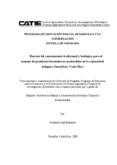| dc.contributor.author | Juep Bakuants, Abelardo | |
| dc.date.accessioned | 2014-10-20T05:35:41Z | |
| dc.date.available | 2014-10-20T05:35:41Z | |
| dc.date.issued | 2008 | es_ES |
| dc.identifier | 371602 | es_ES |
| dc.identifier.uri | https://repositorio.catie.ac.cr/handle/11554/5500 | |
| dc.identifier.uri | http://orton.catie.ac.cr/repdoc/A1961e/A1961e.pdf | es_ES |
| dc.description | Tesis (M. Sc) -- CATIE, Turrialba (Costa Rica), 2008 | es_ES |
| dc.description.abstract | en el bosque podemos encontrar diversidad de especies vegetales maderables y no maderables empleadas por los comuneros, con diversos fines como: construcción de viviendas, uso medicinal, alimenticio, artesanal y ritual. El objetivo del presente estudio fue rescatar los conocimientos tradicionales sobre el manejo de productos forestales no maderables por la comunidad Jameykari y los factores microambientales que intervienen en el establecimiento de estos. Con base en la información de los habitantes de Jameykari se determinó la existencia de productos forestales no maderables silvestres de la zona que son considerados de importancia cultural y espiritual. Como resultado se encontró que las abundancia de estas especies está asociada a las variables pendiente, cobertura de vegetación, altura del dosel, pH del suelo, y algunas de ellas están asociadas con la distancia de las viviendas al bosque. La comunidad indígena Jameykari se encuentra ubicada en la Reserva Indígena Nairi Awari, la cual posee un 88 por ciento de bosque natural, el resto del área está destinado para la actividad agropecuaria y construcción de viviendas The indigenous community Jameykari is located in the Nairi Awari Indigenous Reserve which possesses 88 percent of natural forest. The rest of the area is designated for farming and housing. A variety of timber and non- timber species can be found in the forest. These species are used by the community with purposes such as: house construction medical use, food, crafts and rituals. The objective of this study was to rescue the traditional knowledge through the use of non-timber forest products by community Jameykari and the factors affecting the development of these products. The existence of non-timber forest wild products was determined based on information given by Jameykari inhabitants. These wild products are considered important due to their cultural and spiritual value. As a result, it was found that the abundance of these species is associated with different variables (slope, vegetation coverage, canopy height and soil pH). In fact, some of the five species are associated with the distance of the households to the forest. | es_ES |
| dc.language.iso | es | es_ES |
| dc.publisher | CATIE, Turrialba (Costa Rica) | es_ES |
| dc.subject | PRODUCTOS FORESTALES | |
| dc.subject | NO LEÑOSOS | |
| dc.subject | PLANTAS MEDICINALES | |
| dc.subject | PLANTAS SILVESTRES | |
| dc.subject | CONOCIMIENTO INDIGENA | |
| dc.subject | GRUPOS ETNICOS | |
| dc.subject | USOS TRADICIONALES | |
| dc.subject | CONDUCTA CULTURAL | |
| dc.subject | FACTORES AMBIENTALES | |
| dc.subject | ASPECTOS FISIOGRAFICOS | |
| dc.subject | COSTA RICA | |
| dc.title | Rescue of the traditional and biological knowledge for non-timber forest products management in the indigenous community Jameykari, Costa Rica | es_ES |
| dc.title.alternative | Rescate del conocimiento tradicional y biológico para el manejo de productos forestales no maderables en la comunidad indígena Jameykari, Costa Rica | es_ES |
| dc.type | Tesis de maestría | es_ES |
| dcterms.rights | acceso abierto | es_ES |
| dc.identifier.publication | Turrialba (Costa Rica) | es_ES |


